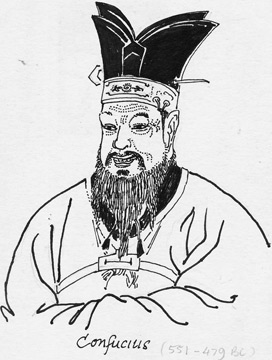The birth of ‘New Confucianism’
 What you know, you
know; what you don’t know, you don’t know. This is true wisdom. -
Confucius What you know, you
know; what you don’t know, you don’t know. This is true wisdom. -
Confucius
Confucius (551-479 BCE) was a legendary teacher in China. Unlike many
Western philosophers who minded their own business, Confucius vainly
sought high political office to effect reforms in the government. He was
born at a time the Zhou Dynasty was on the decline moving from stability
to a warring state. He had certain similarities with Thales, Pythagoras
and Heraclitus who lived in Greece. They all had sought constants in a
world of change. Unlike his Greek counterparts, Confucius sought moral
values that could transform rulers.
While most Western philosophers tried to inculcate moral values into
the individual, Confucius expected the government to cultivate moral
harmony in each person. He did not believe that people will change on
their own unless the government forced them to be virtuous by threat of
punishment. He is one the few philosophers who took such a stand to
bring about a moral society.
Confucius abhorred hypocrites and called them “goody-goody thieves of
virtue.” At the beginning he was a daring and radical educator who
defied tradition. Although he failed as a political reformer, Confucius
is considered a great teacher probably better than Socrates. Confucius
and Socrates had many qualities in common. They were not after wealth or
fame. Confucius said, “The people who live extravagantly are apt to be
snobbish and the people who live simply are apt to be vulgar. I prefer
the vulgar people to the snobs.”
Inspiration
Confucius looked to the past for inspiration. Being a conservative
philosopher he had a great respect for rituals and ancestral worship. In
fact the Zhou Dynasty was in favour of Confucianism. The rulers claimed
that they had received authority from gods to govern the country.
Although he did not belong to the social hierarchy, Confucius was a
scholar who advised the rulers. However, he achieved the status through
merit. He combined old ideals with meritocracy to mould his moral
philosophy.
|

What you know, you know; what
you don’t know, you don’t know. This
is true wisdom. - Confucius |
Modern scholars who try to understand Confucianism depend heavily on
Analects, a collection of his writings and sayings compiled by his
disciples. Although Analects was primarily a political treatise, it
shows how a virtuous man could be made. Confucius did not rely on unseen
gods to aid man, He used the term tian meaning ‘Heaven’ which he thought
was the source of moral order. According to Christianity, man is a
creation of God, but Confucius said Heaven has sent man to the world as
an agent.
Virtue
Although Confucius’ moral philosophy was in line with traditional
Chinese views, he did not believe that virtue was something Heaven-sent.
He said every man had to cultivate virtue assiduously. He depended
heavily on traditional Chinese values such as zhong (loyalty), xiao
(filial piety), li (ritual propriety) and shu (reciprocity). According
to him, a person who cultivated such values became a junzi or a superior
man.
Confucius spoke of five constant relationships. In the first place,
the rulers should be benevolent and the subjects should be loyal to
them. This echoes the sentiments of a Greek philosopher who said
countries should be governed by benevolent dictators. Secondly, parents
should love their children and the latter should be obedient to the
former. Thirdly, husbands should be good and fair in their dealings and
wives should be understanding women. Fourthly, an elder brother should
be gentle and the younger brother should be respectful. Finally, older
friends should be considerate and younger friends should be reverential.
Golden rule
Confucius wanted people to be sincere to change society. To become a
superior man he should recognise what he does not know. About a century
later, the Greek philosopher Socrates also said that he did not know
anything. A golden rule runs through Confucianism. It is “Do as you
would be done by.” Centuries later Jesus Christ expressed similar
sentiments. Like the Buddha, Confucius too prescribed what not to do to
remain virtuous.
Confucius had little success in reforming the rulers. Dejected by the
unwelcome attitude of the ruling fraternity, he concentrated on the
teaching of philosophy to his pupils. One of his disciples Meng Zi
anthologised his writings which later helped to revive Confucianism in
the Han dynasty. From then on, Confucius’ ideas had a profound effect on
society. Parallel to Confucianism, Buddhism and Daoism also flourished
in China. A Neo-Confucian School of Philosophy flourished in China from
the ninth to 12th centuries. It spread to neighbouring countries such as
Korea and Japan. With the translation of his books, Confucianism spread
in Europe in the 17th century. Today the People’s Republic of China
shows a keen interest in Confucianism. With the influence of Western
philosophy a “New Confucianism” has come to stay in China.
|

